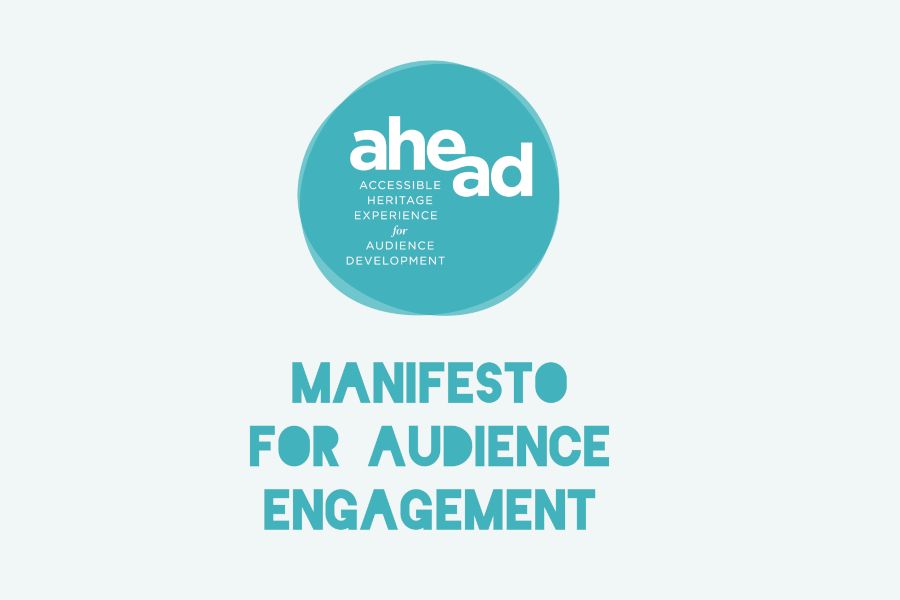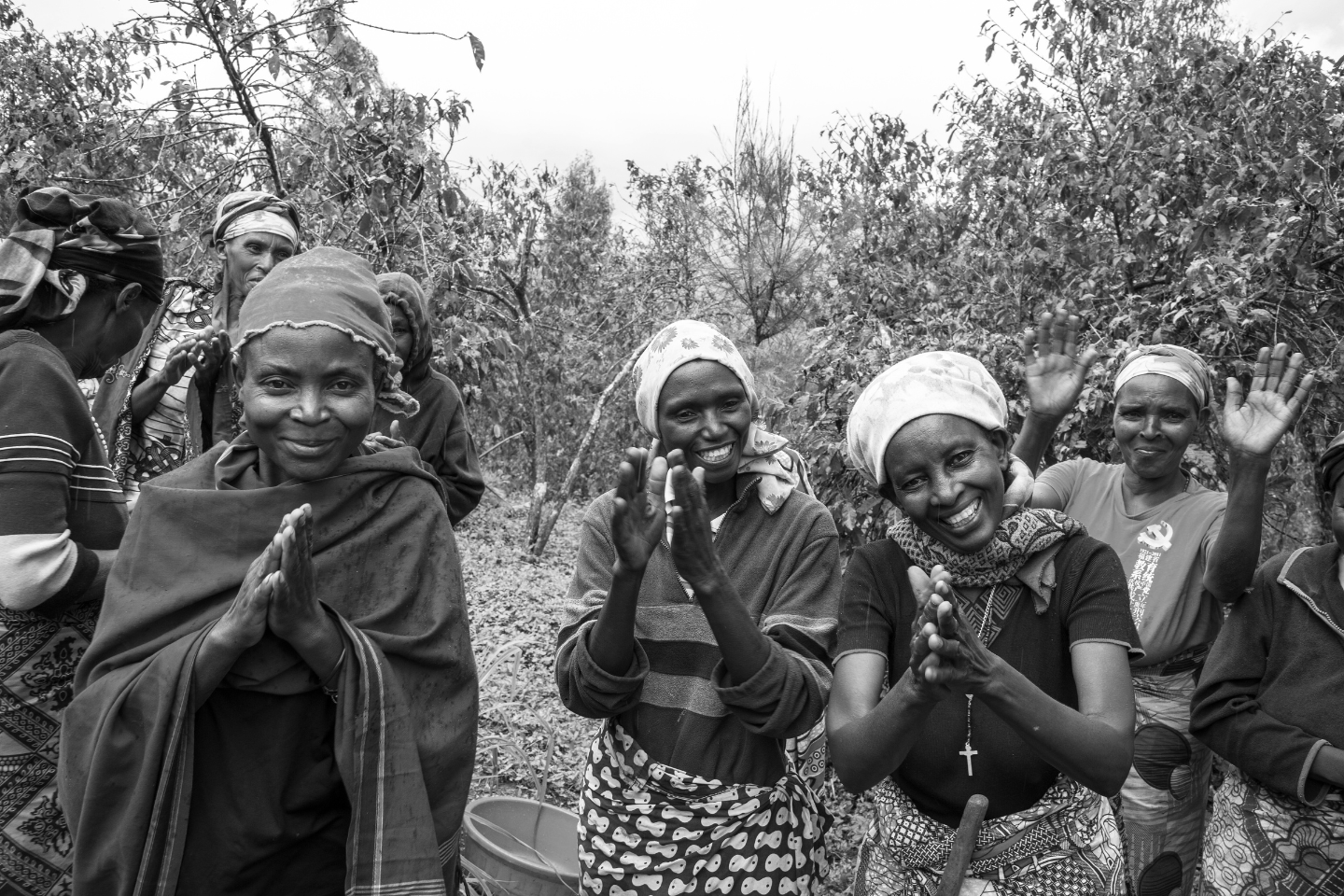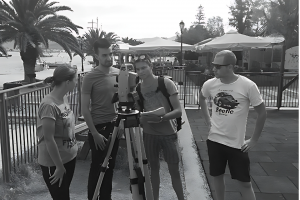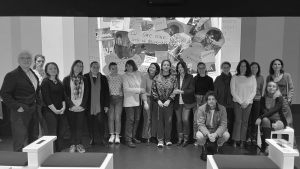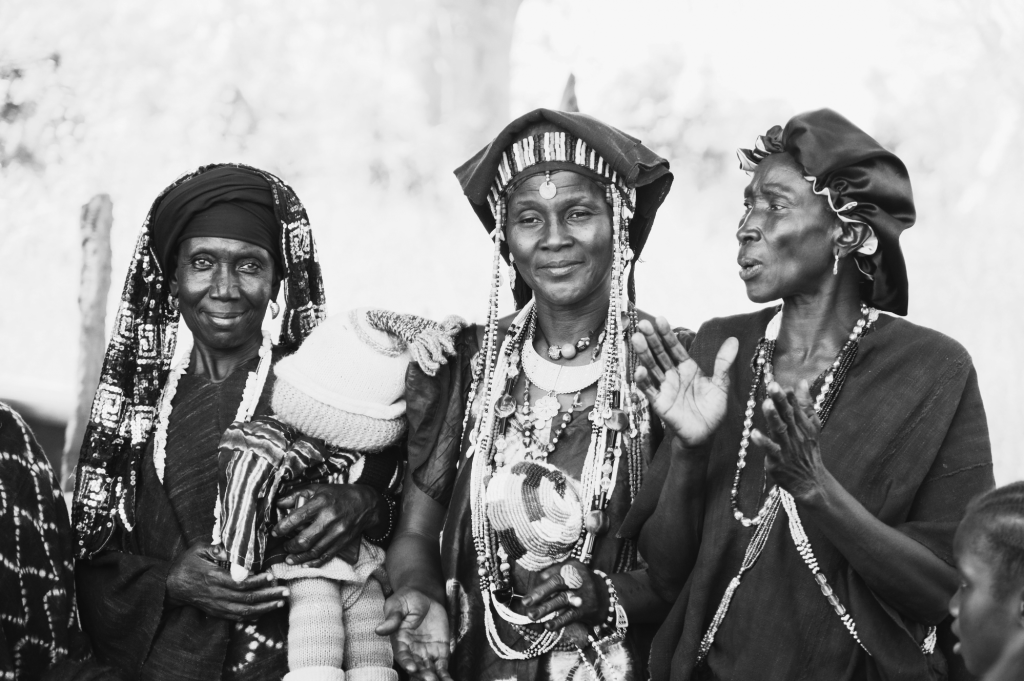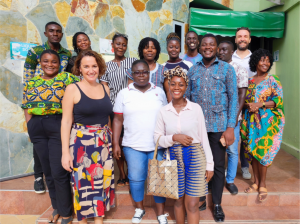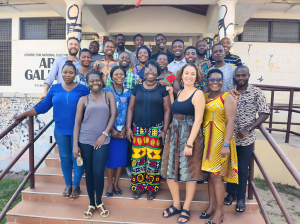Tag Archives: community engagement
AHEAD: A Manifesto for Redefining Heritage Experiences
The Heritage Management Organization is proud to be part of the AHEAD project, an international initiative funded by the European Union’s Creative Europe Programme. Today, we’re excited to announce the launch of the AHEAD manifesto, a groundbreaking document outlining a new vision for cultural audience development. We are calling upon all cultural heritage professionals, community leaders, and policy makers to sign up to the manifesto and become part of the AHEAD network.
A Human-Centered Approach to Heritage
The AHEAD manifesto calls for a fundamental shift in how we approach heritage experiences. It champions a human-centered approach, prioritizing accessibility, inclusivity, and audience engagement. This means moving beyond traditional models and fostering a more dynamic and participatory relationship between cultural institutions and their visitors.
The manifesto is the result of extensive research and collaboration among AHEAD consortium partners across Europe. It emphasizes the importance of audience development as a transformative process. This process is rooted in listening to visitors, ensuring inclusivity for all, and empowering them to actively participate in their heritage experiences.
Equipping Professionals for Success
AHEAD recognizes that achieving this new vision requires well-equipped professionals. To address this need, the project offers a comprehensive capacity-building program. This program equips heritage professionals with essential skills among others in:
- Audience Insights: Understanding the needs and interests of diverse audiences.
- Heritage Interpretation: Crafting engaging and meaningful narratives around cultural heritage.
- Strategic Communication: Effectively communicating the value of heritage to target audiences.
- Impact Assessment: Measuring the success of heritage experiences and their impact on communities.
The ultimate goal of AHEAD is to empower cultural professionals to reshape how audiences engage with heritage. This will lead to positive social, cultural, and economic development. Imagine museums, parks, and archaeological sites transformed into welcoming spaces for all, serving as vibrant hubs for community engagement and collaborative value creation.
Join the Movement
The AHEAD manifesto is a call to action for cultural heritage professionals worldwide. We invite you to endorse the manifesto and join this pioneering initiative. By working together, we can redefine the landscape of heritage experience design and usher in a new era of audience participation and appreciation.
Learn more about the AHEAD project, endorse and download the manifesto on the AHEAD website.
Cultural heritage as a catalyst for peace: Empowering communities in peacebuilding efforts
While the international media often spotlights the cycles of war and violence plaguing Africa, the quieter, effective grassroots efforts aimed at overcoming trauma, restoring justice, and reconciling conflicting groups receive less attention, writes Paulin Regnard*
In various corners of the continent, traditional customs open paths diverging from conventional legal system formalities, sometimes in dramatic fashion. For instance, informal transitional justice mechanisms, like Rwanda’s gacaca courts and South Africa’s Truth and Reconciliation Commission, have effectively provided accessible and inclusive solutions. Rooted in traditions of reconciliation and communal healing, these practices bridge the justice gap, returning ownership and authenticity to the healing process. Despite their limits, these methods show that cultural heritage is more than a relic of the past — it’s a bridge to the future, even in the most difficult settings.
In conflict-impacted countries, cultural heritage sustains continuity and identity. Initiatives that raise awareness, document cultural assets, and train heritage advocates are essential in empowering social groups, especially youths, to bridge ethno-political divides. My experience in UN peacekeeping, especially in South Sudan and he DRC, has taught me the effectiveness of community engagement, with locals keen to share their insights and solutions. I’ve also learnt that mobilizing communities, government institutions, and civil society to protect cultural sites and intangible heritage is no easy task. In fact, in areas impacted by armed violence, these issues often rank at the bottom of priorities whereas security and livelihoods are primary concerns.
Efforts to document local ecological knowledge have aimed to bolster indigenous and local community management of natural resources including within protected areas. However, these attempts are sporadic and limited to very specific geographical contexts. As a rule, the value of cultural heritage is largely overlooked or underappreciated in humanitarian, peace, and development initiatives. It’s crucial for peacemaker, aid workers and their counterparts to acknowledge why heritage plays such a vital role in people’s identities and perceptions. Incorporating heritage into strategies for enhancing democratic governance, resolving conflicts, and stimulating economic growth can provide a good starting point, highlighting its importance to building peaceful and prosperous societies. Let’s explore these aspects further.
Firstly, restoring effective state authority is a top priority in fragile countries. Local and subnational governments (along with customary authorities) play a key role in delivering essential services amidst challenges like understaffing and inadequate infrastructure. Highlighting cultural assets into local development policies should help recognize their relevance to a region’s identity and potential. Collaboration between public institutions, civil society and implementers is essential to ensure projects are inclusive, sustainable, and support wider development objectives. Unfortunately, a post-crisis context is hardly favorable. Management capacities are often limited, skills gaps remain to be filled, and politicians do not always grasp the socio-economic benefits of heritage.
Furthermore, resolving communal disputes, particularly those rooted in identity and resource competition, is necessary for mending divisions and preventing further conflicts. As it embodies a shared history and traditions. cultural heritage can offer a neutral ground for discussion and cooperation, provided it isn’t exploited by conflicting parties. Also, heritage conservation activities can contribute to peace by involving all sectors of local society, government agencies and civil society organizations. Trained facilitators can help further demonstrate the value of heritage as a connector.
Igniting local development and job creation is essential for economic revival. Cultural heritage, through avenues like cultural tourism, site management, and traditional crafts, offers significant potential for growth. However, securing adequate resources remains a substantial challenge in fragile contexts. With proper support, these areas can significantly boost economic recovery and community revitalization, underscoring cultural heritage’s role as a driver of development and job opportunities.
Intangible cultural heritage (ICH) can help restore and strengthen social cohesion and civic trust in places like South Sudan and the DRC, just to cite two places I am familiar with. These two young nations, characterized by decades of civil wars, non-state armed group activities, and inter-community conflicts, share the multicultural and multilingual traits common to many sub-Saharan African countries. In such contexts, ICH can bring communities together, showcasing its importance in the broader peacebuilding context.
A typical example is how traditional conflict resolution, an integral part of ICH, supports grassroots peacemaking. Engaging traditional chiefs, who embody their clans’ customs and wield authority to uphold peace agreements, has often proved effective. Unfortunately, good traditional practices are not recorded and fade in collective memories. in many areas of the DRC and South Sudan, decades of turmoil and institutional changes have weakened chiefs’ influence. Additionally, modern societal shifts lead to the neglect of traditional practices by younger generations. Moreover, it’s important to recognize that while cultural traditions merit respect, not all traditional methods and mechanisms are conducive to values of inclusiveness and gender equality.
Another ICH component, music and dance, central to social life in Africa, serve as outlets for communities. The Amani Festival in Goma, DRC, exemplifies this, achieving remarkable success. Since its launching by a community-based organization in 2014, the three-day event has been dedicated to fostering peace and reconciliation in the Great Lakes region, attracting national and international artists, along with thousands of spectators from the DRC and beyond. Offering more than just music, the festival includes workshops, debates, sports, and exhibitions. The next edition is scheduled for June 2024.
As a nation navigates the path towards peace and recovery, we must not overlook the plight of refugees and internally displaced people, who are particularly vulnerable to the loss of their cultural heritage in times of crisis. Their vulnerability underscores the importance of incorporating cultural heritage not only into peacebuilding strategies per se, but also in humanitarian aid. By doing so, we recognize heritage as a critical component alongside other cross-cutting themes like gender equality and human rights, thereby ensuring a more holistic approach to rebuilding and healing communities.
* Paulin Regnard is an experienced Peacebuilding & Democratic Governance Expert and former UN Field Manager
Develop your heritage management expertise with HERITΛGE’s cutting-edge Summer Field Schools
Develop your heritage management expertise: gain new skills and embrace best practices with HERITΛGE’s cutting-edge Summer Field Schools
HERITΛGE is thrilled to announce we are now accepting applications for our upcoming Summer Field Schools, offering exceptional opportunities for cultural heritage professionals. These intensive programs delve into crucial aspects of heritage management, providing participants with hands-on experience and cutting-edge knowledge in two key areas: Digital Tools for Cultural Heritage and Engaging Communities for Cultural Heritage.
Digital Tools for Cultural Heritage Summer School: Unlock the Power of Digital Tools in Heritage Management
In the ever-evolving landscape of heritage management, digital tools play a pivotal role. HERITΛGE, in collaboration with HOGENT, presents a unique summer school program focusing on the acquisition, processing, management, and analysis of spatial data. This program introduces participants to three specialized courses:
- GIS (Geographic Information Systems)
- Photogrammetry and Image-based 3D Modeling
- Terrestrial Laser Scanning
Theoretical aspects will be delivered online, allowing for flexibility, while on-site tasks will provide practical, hands-on experience. For those able to travel to Greece, an exciting opportunity awaits to practice Photogrammetry and Laser Scanning in the field with in-person support from instructors. The program, organized in collaboration with the municipality of Nafplio, Greece, aims to document historically significant structures, serving as the educational arm of the HERITΛGE research project.
Engaging Communities for Cultural Heritage Summer School:Redefining Community Engagement in Heritage Management
Community engagement is at the forefront of heritage institutions worldwide. HERITΛGE’s hybrid program focuses on community-led initiatives, social and artistic research, and practical exercises. Collaborating with local festivals and initiatives on the Greek island of Paros, this program offers a dynamic approach to community engagement. Participants, whether online or in person, will explore ethnography, oral history, and multimedia content creation, contributing to research and the preservation of local heritage.
Why Choose Heritage Management Organization’s Summer Field Schools?
Tailored Learning: Programs cater to both beginners and professionals, providing a platform for skill development and research.
Expert Collaboration: Collaborate with experts from renowned partners.
Real-world Experience: Engage in practical exercises, fieldwork, and community-led initiatives to apply theoretical knowledge.
Global Impact: Contribute to larger research projects, shaping the future of heritage management worldwide.
How to Apply:
For those eager to embark on this transformative journey, applications are now open. Visit our website for more information and to secure your spot in these exciting summer field schools.
Whether you’re interested in digital tools or community engagement, HERITΛGE invites you to explore, learn, and contribute to the preservation of cultural heritage.
Join us this summer and be part of an international community dedicated to shaping the future of heritage management!
Unveiling AHEAD: a new EU-funded project to develop audience engagement
At HERITΛGE we are delighted to announce the launch of a new EU-funded project AHEAD (Accessible Heritage Experience for Audiennce Development). The project, that seeks to remodel the heritage experience and provide a blueprint to help cultural organizations develop and engage new and existing audiences, held its kick-off meeting in Rome on January 24-26 2024.
AHEAD, which is funded by the European Union’s European Education and Culture Executive Agency (EACEA), brings together a dynamic consortium of partners, including Melting Pro (MEP), an Italian cultural consultancy that is responsible for managing the project; the Italian Ministry of Culture (MIC), the University De Le Iglesia De Deusto, in Bilbao, Spain, and the Brussels-based innnovation agency Impact Valley. Participants include the Archaeological Park of Ostia Antica in Italy and the Altamira National Museum and Research Centre in Spain.
Challenges in Cultural Heritage Sector and the AHEAD Impact Vision
Cultural Heritage (CH) stands as a vital economic and social resource for EU countries, yet many institutions face challenges in financial sustainability and audience engagement. AHEAD tackles these issues by addressing the low levels of entrepreneurial and audience-centered skills that are often found in cultural heritage institutions, introducing participatory audience development practices, and breaking down resistance to new marketing approaches among CH professionals all the while focusing on increasing accessibility for all and engaging local communities.
AHEAD’s vision is to innovate working practices in the CH sector by applying human-centered approaches, learning by doing, and data-driven methodologies. This transformative project aims to make the cultural heritage sector more relevant to communities, financially sustainable, and a catalyst for social, cultural, and economic growth.
The AHEAD Blueprint
AHEAD comprises three key components:
- Capacity Building Program: Enhancing the skills of CH professionals in Audience Development, Marketing & Promotion, and Business Models
- AHEAD Model: Developing a participatory audience development practice, piloted with CH organizations from Spain, Italy, and Greece.
- Impact and Innovation Strategy: Creating a strategy to upscale the methodology at the EU and international levels, overcoming systemic barriers in management and participation.
The AHEAD journey began with its kick-off meeting in Rome on January 24-26. Partners collaborated on shaping the AHEAD manifesto for audience engagement, taking into account all three key components of the project. Notably, the meeting saw the participation of end-users, including representatives from the Archaeological Park of Ostia Antica and the National Museum and Research Center of Altamira who contribution vital insights for the development of the project’s components.
During the project, HERITΛGE introduced partners and participants to SHIFT, a major EU-funded research project to make cultural heritage more appealing and inclusive.
Importantly, the project wrapped up with a presentation of AHEAD and a networking session with representatives of Italian cultural institutions at Rome’s Europa Experience – David Sassoli building that showcases the institutions and contributions of the European Union.
Stay tuned for updates as AHEAD unfolds, unlocking the full potential of cultural heritage for current and future generations.
Community & Economic Development: Introducing a new workshop
By Dr. Paul Burtenshaw
Cultural heritage managers are facing a variety of pressures in managing the economic aspects of heritage resources. Sites are increasingly looked upon as assets for local and national sustainable development, including job creation. Development of tourism at sites can often come with expectations to boost local or national economies. Organizations and authorities are often asked to diversify funding streams. This could include adding commercial elements to their operations – shops, products, events – to enhance stretched public budgets. And the language of heritage value now includes economic and quantitative perspectives – from approaching heritage as resources or capital to providing evaluative evidence to justify funding.
These pressures come with opportunities and pitfalls. Heritage managers increasingly need the knowledge and skill to navigate ‘economic value’ and understand how to utilize it to achieve their own cultural, social and sustainability goals.
The idea of this brand new workshop which will take place on 14-16 February, is to equip heritage managers with the capacity to understand the language of economic value, how to communicate it, and how to manage it for the sustainability of sites and their values. This includes a firm understanding of the motivations for mobilizing cultural resources for economic benefit and the different strategies that could be employed to achieve different goals. Importantly this includes an appreciation of the feasibility of, and limits to, such strategies and approaches to data collection to understand the success, or not, of attempts.
The workshop will guide attendees through the development of a plan for the creation of economic benefits for their own case studies, applying strategies to their own individual needs. This could include raising money to put sites on a surer economic footing, mobilize heritage as a sustainable resource for local businesses, or collect data to better demonstrate the value of heritage to partners and communities. As a result of the course attendees will be able to implement economic development strategies in their own locations.
*Dr Paul Burtenshaw is an expert in heritage economics, heritage tourism and how cultural heritage supports sustainable and community development.
**Find out more and apply for the workshop here.
Empowering Heritage Practitioners in Ghana: Insights from Workshops in Winneba and Accra
In December 2023, two landmark community engagement in cultural heritage workshops took place in Winneba and Accra, Ghana, bringing together dedicated heritage managers from various regions. These workshops, part of HERITΛGE’s HerMaP Africa program and supported by the Mellon Foundation’s Humanities in Place program, aimed to equip participants with the tools and insights to actively engage communities, navigate cultural complexities, and delve into the rich tapestry of oral history.
The Accra workshop began on Wednesday 6th December with interactive presentations to 22 attendees by Dr. Aris Anagnostopoulos, Dr. Lena Stefanou and HERITΛGE director, Dr. Evangelos Kyriakidis. On day two (Thursday 7th) attendees had the chance to explore heritage projects close to their hearts and present in small groups on how they might stimulate local engagement. The projects presented included the Mystic Ayi Tree, traditional Ghanian fabrics, oral storytelling traditions and the history of the famous priest Okonfo Anokye. The final day (Friday 8th) was dedicated exclusively to exploring oral history in heritage contexts. The theories and techniques of preserving oral history were presented to the participants and they were later asked to conduct mock interviews about one group member’s childhood. Following on from this, each group produced an interview report which would help guide them in future oral history research.
The following week the same workshop was conducted in Winneba from Monday 11th-Wednesday 13th December. Although this workshop involved fewer participants (up to 18 on the final day a broad range of heritage ideas and projects were explored. The group exercise, this time conducted on day 1, produced ideas about promoting tourism through sculptural monuments in Efutu region, promoting widow’s rights in the Deogo communities and a “reclaiming our roots” festival. The discussions were lively and raised some crucial ethical questions about how a heritage practitioner should involve his or herself in cultural practices. On day two we introduced a new “Who are your Communities” exercise in which participants identified and presented their community and its values. The final day, as in Accra, confronted oral history in heritage contexts. Once again it was very encouraging to hear such a diversity of approaches, questions and opinions and each group produced a helpful report to take away.
All in all, we are very excited about how the workshop went and look forward to the potential for future expansion into other areas of Ghana.

